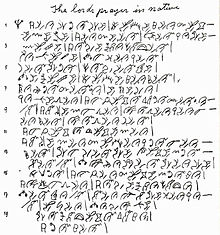| Yugtun | |
|---|---|
 | |
| Script type | Syllabary
|
| Creator | Uyaquq |
Time period | Invented 1900 |
| Direction | Left-to-right
|
| Languages | Central Alaskan Yup'ik |

The Yugtun or Alaska script is a syllabary invented around the year 1900 by Uyaquq to write the Central Alaskan Yup'ik language. Uyaquq, who was monolingual in Yup'ik but had a son who was literate in English, [2] initially used Indigenous pictograms as a form of proto-writing that served as a mnemonic in preaching the Bible. However, when he realized that this did not allow him to reproduce the exact words of a passage the way the Latin alphabet did for English-speaking missionaries, he and his assistants developed it until it became a full syllabary. [3] Although Uyaquq never learned English or the Latin alphabet, he was influenced by both. [2] The syllable kut, for example, resembles the cursive form of the English word good.
The Yup'ik language is now generally written in the Latin alphabet. [2]
Bibliography
- Albertine Gaur, 2000. Literacy and the Politics of Writing, ISBN 978-1841500119
- Alfred Schmitt, 1951. Die Alaska-Schrift und ihre schriftgeschichtliche Bedeutung, Simons, Marburg
- Alfred Schmitt, 1981. Untersuchungen zur Geschichte der Schrift. Eine Schriftentwicklung um 1900 in Alaska, Harrassowitz, Wiesbaden (Reprint der Ausgabe Leipzig 1940),
ISBN
3-447-02162-4
- Vol. 1 Text, vol. 2. Abbildungen
References
- ^ The Pater Noster in Uyaquk's pictograms, 1909
- ^ a b c Coulmas, Florian (1999). "Yupik writing". The Blackwell Encyclopedia of Writing Systems. Blackwell Publishers. pp. 572–573. ISBN 9780631194460.
- ^ Ian James, "Yugtun script", Sky Knowledge, April 2012